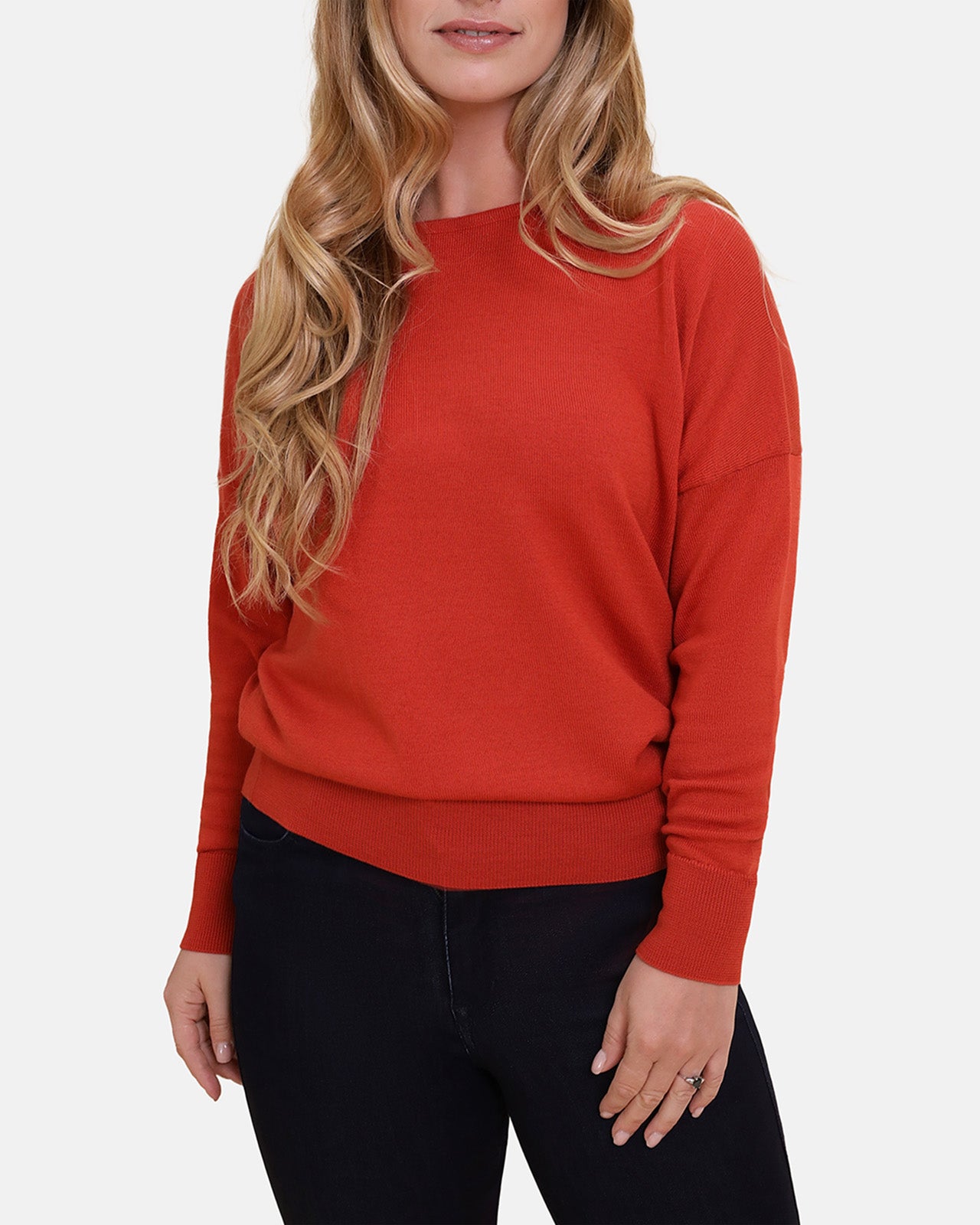Frequently Asked Questions
Our Products & Materials
Our journey begins in Tasmania's pristine landscapes, where we source our exclusive superfine Merino wool from a single farm dedicated to environmental stewardship. This exceptional location—with its pristine air quality and balanced ecosystem—yields wool of remarkable fineness and quality. The farm upholds rigorous standards of land management and animal welfare, ensuring that each fibre reflects our commitment to both luxury and sustainability. Certified by the Responsible Wool Standard (RWS), this careful stewardship of the land produces wool that is not just superior in quality, but embodies our ethos of absolute sustainability. Visit our Tasmanian farm story
The unique combination of pristine environment, sustainable farming practices, and carefully selected breeds results in superfine wool with extraordinary properties. Our Merino fibres measure less than 18.5 microns in diameter—finer than most human hair—creating garments of unparalleled softness and comfort. This exceptional fineness, combined with wool's natural temperature regulation and moisture management, delivers a sensory experience that mass-market wool simply cannot match. The result is knitwear that's naturally breathable, odour-resistant, and incredibly soft against the skin. Experience the difference
Unlike conventional wool that many find irritating, our exclusive superfine Tasmanian Merino creates a remarkably different sensory experience. The extraordinary fineness of the fibres (under 18.5 microns) ensures they bend upon contact with skin rather than creating the prickly sensation associated with coarser wools. This makes our knitwear suitable even for those who typically find wool uncomfortable. Most first-time wearers of our garments don't comment on comfort—they simply smile. We think you will too. The comfort of our next-to-skin knitwear must be experienced to be truly understood. Shop our collection
Each Wide Open World garment is meticulously created in Italy, a country with an unrivalled heritage in luxury knitwear production. We partner with a state-of-the-art facility specialising in high-end manufacturing, where skilled artisans transform our premium fibres into exquisite knitwear. Not satisfied with traditional excellence alone, we continuously challenge our partners to innovate and elevate their craft. Our manufacturing facility demonstrates parallel environmental values—powered by solar energy and employing closed-cycle washing technology to minimise its ecological footprint. Discover our Italian craftsmanship
Yes, absolutely. Our Tasmanian partner farm adheres to strict animal welfare standards and uses ethical alternatives to mulesing as humane means of flystrike prevention. We reject practices that compromise animal well-being for commercial convenience. Our wool comes from a single farm where sheep roam freely in low-stock densities, ensuring their natural behaviours are respected. The farm is certified by the Responsible Wool Standard (RWS), guaranteeing humane treatment and traceability. We have visited the farm personally and can confirm that sheep are well treated and looked after, providing a wonderful experience that aligns with our values of progress and morality. Read about our ethical sourcing
Each product page features a detailed size guide with specific measurements to help you find your ideal fit. Our knitwear is designed with a contemporary silhouette that balances elegance with comfort. The natural stretch of merino wool provides flexibility while maintaining shape. If you're between sizes, consider your preferred fit: size up for relaxed comfort or down for a closer silhouette. For personalised sizing guidance, our care team is available at care@wideopenworld.co to ensure your selection perfectly complements your preferences and physique. We also offer free size exchanges within 30 days to ensure the perfect fit.
We use synthetic dyes that comply with OEKO-TEX 100 and ZDHC standards (zero hazardous chemicals). While natural dyes might seem more sustainable, they actually require land-intensive crops and synthetic fertilisers. Our carefully selected dyes are rigorously tested for safety and minimal environmental impact, ensuring they're safe for both you and the environment. All our dyes are tested to ensure they won't cause skin irritation and maintain their vibrancy through countless washes.
Recycled synthetics still shed microplastics, while recycled wool often downgrades fibre quality. Looking at the economic system holistically, recycled materials rely on virgin stocks, so enabling virgin stocks to be used sustainably is even more important than using recycled materials. We prioritise natural, biodegradable materials that align with our absolute sustainability ethos. Our Merino wool's longevity (decades of wear) combined with our sustainable business model demonstrates that luxury can be a solution to environmental challenges. Finally, our wool can be recycled at the end of its life since wool is the most recycled fibre in the world, allowing for numerous future uses. Discover our material choices
Care & Longevity
Our garments are engineered for remarkable longevity with minimal maintenance. Machine washing is not only permissible but recommended, provided your machine has a wool setting operating below 30°C with a gentle spin under 300 RPM. This controlled process preserves the integrity of the fibres better than hand washing, which can create inconsistent temperatures and unnecessary friction. For those who prefer hand washing, gentle soaking according to our care instructions works equally well. After washing, reshape while damp and dry flat away from direct heat. To maintain that pristine finish, lightly iron inside-out on a low setting when necessary. Instructions can be found in the printed document in the postal boxes and on our Care guide page.
One of Merino wool's most remarkable qualities is its self-cleaning ability, significantly reducing the need for washing. Through extensive testing, we've found that washing just three times per year is sufficient for maintaining garments in optimal condition. Merino wool's natural antibacterial properties and superior moisture management make it exceptionally resistant to odours. When you notice any scent developing, particularly in areas worn next to skin, simply air your garment outdoors for a few hours. This natural refreshing process eliminates odours without the need for washing, extending your garment's lifespan and keeping maintenance to a minimum.
When cared for properly, your Wide Open World knitwear is designed to be a lasting presence in your wardrobe for decades. The combination of extraordinary fibre quality, innovative knitting techniques, and meticulous construction creates garments that maintain their shape, softness, and appearance through years of regular wear. Our customers have reported their pieces becoming more cherished over time, developing a personal character while maintaining their elegant aesthetic. This longevity reflects our commitment to sustainability—creating fewer, better garments that transcend seasons and trends. We also offer tailored advice regarding repairs to ensure your investment lasts.
Sustainability Philosophy
Our APres model represents true sustainability, not greenwashing. Carbon offsetting relies on questionable math (like tree-planting to "counterbalance" emissions), while APres prevents harm by preserving 200m² of land per garment via the Tasmanian Land Conservancy, rejecting fossil fuel offsets for marketing purposes, and prioritising biodiversity over carbon tunnel vision. We tax our emissions internally and invest in the energy transition—by far the most effective way to accelerate our transition to a low-carbon economy, not arithmetic gambits that are scientifically misguided. The most important aspect is that our economy is expanding while already in severe overshoot. Rationality suggests the priority lies in protecting what should remain first, through land conservation, and taxing emissions to subsidise the energy transition. Discover the APres model
Absolute sustainability represents sustainability in its truest form. We've added "absolute" to distinguish our approach from the industry's common misconception that merely reducing environmental impact constitutes sustainability. True sustainability isn't about doing less harm—it's about operating within the Earth's ecological boundaries.
At Wide Open World, absolute sustainability means preserving ecosystem integrity by maintaining natural habitats and preventing environmental degradation. It means managing water consumption to support the health of freshwater ecosystems. It means avoiding chemical accumulation in the environment and contributing to climate stability.
Rather than focusing solely on reducing impacts, our approach begins by respecting nature's inherent limits. Following the APres sustainable business model, we collaborate with nonprofit organisations to manage ecological assets in the regions we operate, allowing ecological constraints to guide our business model. This philosophy ensures we contribute to maintaining the natural equilibrium upon which all life depends. Learn about absolute sustainability
There's a common misconception that local sourcing is always more sustainable, particularly regarding carbon emissions. However, sustainability requires a holistic perspective beyond simple distance calculations.
Our Tasmanian Merino wool is transported via container ship, which produces approximately 50 times less CO₂ than air freight. This shipping adds about 0.5kg CO₂e per jumper—less than 4% of the garment's total emissions and equivalent to just two washing machine cycles. Considering our knitwear requires washing only three times annually, this transportation impact becomes negligible in a truly sustainable wardrobe.
CO₂ from fossil fuels matters, no matter how small the quantity. However it needs to be evaluated holistically, in the face of the aggregate thrust of national emissions, and pragmatically with available data.
More importantly, our sourcing decision considers the entire ecosystem impact. The Tasmanian farm we partner with maintains exceptional environmental stewardship practices, preserving biodiversity and natural habitats. Our partnership with the Tasmanian Land Conservancy further helps protect land, on perpetuity, and in the same region. This holistic approach to sustainability—considering not just carbon but land management, forests, biodiversity, and water usage —guides our sourcing decisions. Read our chapter beyond carbon tunnel vision
In an industry often shrouded in ambiguity and greenwashing, we believe radical transparency is essential for building trust and driving genuine change. Our name—Wide Open World—reflects this core value.
We invite customers, competitors, and critics alike to examine every aspect of our operation. From our farm partnerships in Tasmania to our manufacturing processes in Italy, we document and share the complete journey of our garments. This transparency extends to our sustainability metrics, which we measure against scientific carrying capacities rather than industry schemes that fall short of driving the systemic change that is required to transform our economy.
Through detailed product journeys, behind-the-scenes content, and open conversations about both our achievements and ongoing challenges, we establish accountability not just for ourselves but for the industry at large. This transparency isn't simply about building consumer trust—it's about creating a blueprint for absolute sustainability that others can learn from and improve upon.
Our pricing reflects the true cost of sustainable luxury: fibre rarity (superfine Tasmanian Merino under 18.5 microns, bespoke spun yarn), artisan craftsmanship (Italian-made with centuries-old techniques in a state-of-the-art factory), and genuine sustainability work (200m² conserved per garment, emissions taxed to invest in real low-carbon solutions, and working to promote regional governance). This means you invest in fewer, better pieces that last decades rather than seasonal replacements. You're also supporting a new way of doing commerce—the stewardship way that has been upheld by indigenous people for centuries. When you consider cost-per-wear over decades, plus the positive environmental impact, our knitwear represents exceptional value.
Shipping & Customer Service
Manufacturing: No air freight—wool travels by container ship, typically once a year (50x lower emissions than air). Customer deliveries: Carbon-neutral shipping via our partners, with plastic-free packaging. A note on carbon-neutral: Our partners have decided to follow the carbon-neutral trend which signals intention but doesn't change the fact that the combustion of fossil fuels remains highly problematic, starting with air shipment. We believe it's important to transparently highlight this fact, even though these emissions contribute a small fraction of our total emissions. Subsidising the low carbon economy is a much more effective strategy which is the one advocated by the sustainable business model APres and what we do at Wide Open World.
We offer a 30-day return policy for unworn items in original condition with tags attached (when provided). If you need a different size, we provide free exchanges within the UK. For international customers, we cover return shipping costs for size exchanges. Our goal is to ensure you're completely satisfied with your purchase. If you have any sizing concerns, please contact our care team at care@wideopenworld.co before ordering for personalised advice. View our full return policy
Community & Advocacy
Join our Restore Balance™ initiative:
- spread awareness of projects that deteriorate natural habitats in your region,
- advocate for policy changes to stop subsidising fossil fuels, and
- follow @wideopenworld.co for conservation campaigns using #RestoreBalance.
Support Natropy's Collective for Absolute Sustainability:
- host community discussions using our APres toolkit to discuss the state of local ecosystems in the context of planetary boundaries, or
- if you're a business, join the Collective to help fund one of the most important research and movements in the history of our civilisation. Join the Collective



